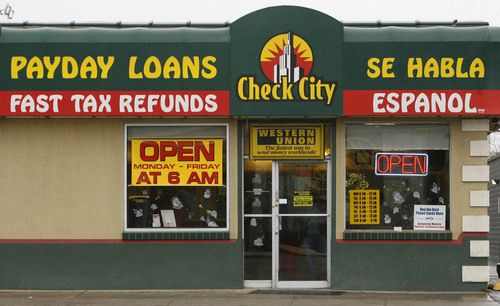This is an archived article that was published on sltrib.com in 2014, and information in the article may be outdated. It is provided only for personal research purposes and may not be reprinted.
Perhaps the most surprising thing about Utah's average 474 percent interest rate on payday loans is that there are six states with higher rates. Idaho, South Dakota, Nevada, Delaware and Wisconsin all have at least 500 percent average interest on payday loans.
And those other states did it without ever having John Swallow as their chief law enforcement officer.
Researchers at the Pew Charitable Trusts have released a study of payday lending laws around the country, and, not surprisingly, the interest rates are highest in the states that have no limits on rates. That includes Utah, where many of the people behind the state's 565 payday-lending stores were contributors to Swallow, who left office in disgrace amid allegations that he was protecting payday lenders, among others. Those same companies have also spread their money around to state legislators.
Borrowing money makes sense in a lot of situations, and very few people make it through life without loans. They allow people to maintain basic needs like working automobiles, and they encourage home ownership, with all the benefits that means for individuals and for society.
But there is no legitimate use for a 474 percent interest loan. That's 9 percent per week. That is true even for people who have disposable income, but it's especially true for anyone living paycheck to paycheck. When people get behind, they need to negotiate with their creditors, refinance their debts or, as a last resort, declare bankruptcy. All of these options are more financially viable than borrowing more money at brutally high interest.
It's noteworthy that there are 15 states that cap loan interest rates at 36 percent, still well above the average high credit-card rate, and none of those states have payday lending stores. That's not because they're outlawed. It's because the stores can't make what they consider adequate profits. There is no sign that people in those signs have suffered for the loss.
What's more, in the states with multiple stores like Utah, Pew's research found no benefits of competition. "States with more firms operating, a standard measure of competition, do not see lower prices," the study says. That's where it is legitimate for government to step in. If market forces do not bring competitive rates, they should be capped.
This year the Utah Legislature did make some changes to lending laws, but it stopped short of capping interest rates. Taking that next step will keep more money in working Utahns' pockets.



